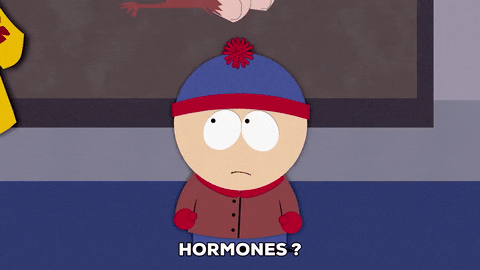
Separating Fact from Fiction: Do Detox Drinks Really Work?
Detox beverages have gained massive popularity in recent years, with promises of everything from quick weight loss to complete bodily "cleansing." Fro...

Weight loss isn’t a one-size-fits-all journey, especially for women. Hormones play a significant role in regulating how we gain or lose weight, and they fluctuate as women go through various life stages. Whether you’re a teen, dealing with pregnancy, or navigating menopause, understanding these hormonal shifts is key to effective weight management. Let’s explore how hormones impact weight loss at every stage—and back it up with some facts and stats.

During puberty, girls experience a surge in estrogen and progesterone, which are responsible for the development of secondary sexual characteristics like breasts and wider hips. This increase in estrogen also promotes fat storage, particularly in the hips and thighs, as the body prepares for potential childbearing.
Fact: Estrogen increases body fat, especially in the lower body, as part of normal female development. Studies show that adolescent girls tend to gain an average of 12-18 pounds during puberty due to these hormonal changes.
Did you know? Even though estrogen leads to fat storage, metabolism is at its peak during adolescence. Your body is rapidly growing, and physical activity can help regulate weight. However, this is also the time when unhealthy eating habits can take hold, making it essential to establish a good relationship with food early on.
Pro Tip: Encourage teens to stay active through sports, dance, or activities they enjoy, and focus on balanced, nutrient-rich meals to keep them energized and healthy.
In your 20s and 30s, your reproductive hormones—estrogen and progesterone—are relatively stable, but lifestyle factors like stress, birth control, and pregnancy can still impact weight. This is also a stage where many women face increased work-related or personal stress, which can spike cortisol levels, leading to increased fat storage, particularly around the belly.
Fact: Studies show that high cortisol levels (the body’s stress hormone) can increase abdominal fat by 2-3% even when there’s no significant change in diet.
Did you know? Pregnancy brings its own hormonal cocktail that triggers weight gain. Women gain an average of 25-35 pounds during pregnancy. Post-pregnancy, your body’s prolactin levels rise to support milk production, and many women struggle to lose that extra weight.
Pro Tip: Keep stress in check with mindfulness practices like yoga or meditation. Pair that with strength training and cardio to support muscle mass and maintain metabolism. Managing stress through physical activity is not only good for your waistline but for your mental health too.

Post-pregnancy, your estrogen and progesterone levels drop sharply while prolactin levels rise if you’re breastfeeding. The postpartum period is also marked by potential thyroid imbalances, which can slow down your metabolism, making it harder to lose weight.
Fact: Women who breastfeed can burn an additional 500 calories per day, which can support postpartum weight loss. However, not all women experience rapid weight loss while breastfeeding, as the body often holds onto extra fat stores for milk production.
Did you know? 1 in 10 women experience thyroid problems postpartum, which can make weight loss even more challenging.
Pro Tip: Give yourself grace and focus on gradual progress. Walking with your baby, gentle strength training, and eating a balanced, nutrient-dense diet can help you lose weight gradually without feeling deprived.
Perimenopause, typically beginning in your 40s, is when estrogen and progesterone levels start to decline. This decrease in estrogen is linked to increased abdominal fat. By the time menopause hits, many women notice a significant change in where they store fat, with more accumulating around the midsection—a phenomenon known as “menopausal belly.”
Fact: During perimenopause and menopause, women can gain 1-2 pounds per year on average, with most of that weight settling around the abdomen due to the hormonal shift.
Did you know? Estrogen helps maintain muscle mass. As it declines, muscle mass decreases, slowing metabolism by as much as 10% by the time women reach their 50s.
Pro Tip: Strength training is crucial at this stage to preserve muscle mass and keep your metabolism active. Focus on fiber-rich foods and healthy fats to keep blood sugar stable and manage stress, which can also contribute to weight gain through elevated cortisol levels.
After menopause, estrogen levels remain low, and you may also experience lower levels of testosterone, which impacts muscle mass. In addition, insulin resistance may become more common, making it harder to process carbohydrates efficiently, which can lead to weight gain.
Fact: After menopause, many women experience a decrease in metabolic rate, with a typical reduction of 100-200 calories per day in the amount of energy burned at rest.
Did you know? Insulin resistance becomes more common after menopause, increasing the risk of developing type 2 diabetes by 4.5% for women in their post-menopausal years.
Pro Tip: Keep up with strength training and prioritize a protein-rich diet to support muscle retention. Reduce your intake of refined carbs and opt for whole grains, vegetables, and lean proteins to stabilize blood sugar and prevent weight gain.

A: Hormones such as estrogen, progesterone, cortisol, and insulin influence how your body stores and burns fat. During puberty, pregnancy, menopause, and other life stages, shifts in these hormones can either slow down or speed up your metabolism, affect appetite, and change how fat is distributed in the body.
A: As estrogen levels drop during menopause, many women experience a shift in fat storage from the hips and thighs to the abdomen. This decrease in estrogen also slows metabolism and leads to muscle loss, which can make it harder to lose weight or maintain current weight.
A: Yes, after pregnancy, hormonal changes such as decreased estrogen and increased prolactin (if breastfeeding) can make weight loss slower. Thyroid function may also be affected, which can further slow metabolism. A gradual approach with a balanced diet and light exercise is best for postpartum weight loss.
A: Chronic stress can lead to elevated cortisol levels, which are linked to increased fat storage, particularly around the abdomen. Cortisol can also increase cravings for high-calorie foods, making it harder to maintain a healthy weight.
A: Strength training is highly effective for weight loss during menopause, as it helps counteract the loss of muscle mass and boost metabolism. Pairing this with a diet rich in lean proteins, healthy fats, and whole grains can help manage weight gain associated with hormonal changes.
A: insulin resistance, which can become more common after menopause, makes it harder for your body to process sugars and carbohydrates. This can lead to weight gain and an increased risk of developing type 2 diabetes. Managing carbs and increasing fiber intake can help mitigate these effects.
The information in this article is for general educational purposes and should not be considered as medical advice. Always consult with a healthcare provider before making any changes to your diet, exercise routine, or health management plan, especially if you have hormonal imbalances or underlying health conditions. Weight loss results and hormonal effects may vary based on individual health profiles.
Hormonal changes at different stages of life significantly impact weight loss. Understanding how your body’s hormones fluctuate through puberty, pregnancy, menopause, and beyond can help you make more informed decisions about diet and exercise. Whether you’re a teen, a new mom, or navigating menopause, tailoring your weight loss strategies to align with your hormonal landscape can make the process more effective—and less frustrating!

Detox beverages have gained massive popularity in recent years, with promises of everything from quick weight loss to complete bodily "cleansing." Fro...

Staying hydrated is essential for your overall health, but plain water can get a little boring. The good news is that infused water—packed with fruits...

In recent years, the rise of non-alcoholic spirits has taken the social scene by storm, offering women (and everyone!) the opportunity to enjoy a craf...

Socializing with cocktails can be fun, but many traditional drinks are loaded with sugar and artificial ingredients that may leave you feeling less th...

The Female Athlete Triad is a serious medical condition that affects physically active women and girls, especially those involved in competitive sport...